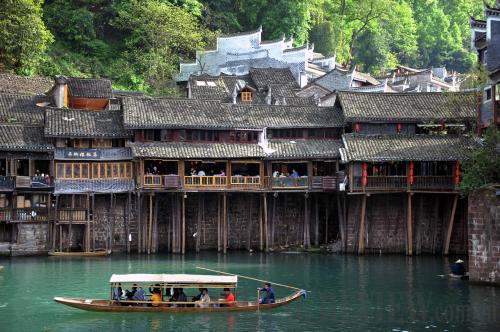|
 |
|
TOWN OF DEBATE: Most of the traditional buildings in Fenghuang Ancient Town are now used as restaurants, bars or hotels (XINHUA) |
Fenghuang Ancient Town, also known as Phoenix City in central China's Hunan Province, is a well-known tourist destination for its outstanding natural beauty and primitive architecture. Entry to the town used to be free, but if tourists want to visit scenic spots inside the town they will have to buy tickets.
Recently, the local government issued a policy that stipulates tourists must pay an entrance fee of 148 yuan ($24) to visit the ancient town, which includes admission to 10 scenic areas.
The measure has sparked a backlash from businesses and tourists. According to an online poll by Sina, one of China's most popular news websites, nearly 93 percent of 90,000 respondents said they would not go to Fenghuang because of the charge, 6 percent said they do not care about the policy since they are not interested in visiting the ancient town and only 1 percent said they will go to the ancient town regardless of the cost.
In the days immediately since the new policy was implemented, local businesses have seen a sharp drop in guests and hotel reservations. There are far fewer tourists on the streets than before. The new policy has also triggered heated discussions among the public on whether the entrance fee should be charged. The following are comments related to the issue.
Supporters
Chun Tian (China National Radio): The adjustment of the entrance fee policy is surely based on local government's careful thinking. Tourists should not solely focus on the charging of entrance fees, but they should also pay more attention to local environmental protection and community service. The ticket policy adjustment is conducive to local environmental protection and the scenic areas' long-term protection.
Zheng Yijun (China National Radio): I think it's all right. To charge an entrance fee will to some extent control the number of visitors at a reasonable level, which in turn will help reduce damage to local environment. The ancient town then will be better protected.
Liu Yuhang (www.cqnews.net): The goal of ancient town protection is to make the tour in this area more comfortable for tourists from near and far. If the local government's decision to collect entrance fees is unshakable, it must do some preparation work to ensure the feasibility of the fee plan and also to better protect local relics. The collected funds should be properly used to improve supportive facilities, all kinds of services and also the overall environment. Everyone, either local business people and residents or tourists have the responsibility to protect the ancient town.
Liu Simin (Global Times): Since the ancient town began to charge for entrance on April 10, the ticket revenue in four days amounted to 2.27 million yuan ($360,000). Most of the income came from group tourists, and only several hundred individual tickets were sold. Meanwhile, the number of tourists dropped to 38 percent of the same period of last year.
Visiting ancient towns, such as Pingyao in north China's Shanxi Province and Lijiang in southwestern Yunnan Province, is now fashionable. People's enthusiasm for Fenghuang Ancient Town will not be easily quelled by the introduction of entrance fees in the nationwide context. However, the town might see a sharp decline in tourists from within the province. These visitors used to tour the town quite often due to the convenience of transport, but they may not come so often or even decide not to come again due to the entrance fee.
This fee policy actually has triggered heated debates on the Internet. Citizens cited Hangzhou, capital city of east China's Zhejiang Province, as an example to refute the fee policy in Fenghuang Ancient Town. The city offers free access to scenic spots around the famous West Lake. But the "West Lake model" is unlikely to be copied in the rest of the country. Nanjing, capital city of east China's Jiangsu Province, wanted to learn from Hangzhou, but its efforts proved to be a failure. On one hand, tourists find visiting Hangzhou is different from visiting Nanjing. On the other hand, the Nanjing government finds that while missing out on ticket revenues, there is no economic compensation from local services booming, which is enjoyed by Hangzhou.
Fenghuang Ancient Town is situated in a remote area with backward economic development. This is one of the major reasons why this town remains so well-preserved. This town is the home for local residents and to some extent, the town is their private assets. You may ask for entrance fees when people come to see your private assets, and can also offer free access. It's a free choice for the local people as for what kind of commercial model should be adopted. Therefore, to introduce the entrance ticket is theoretically reasonable.
| 